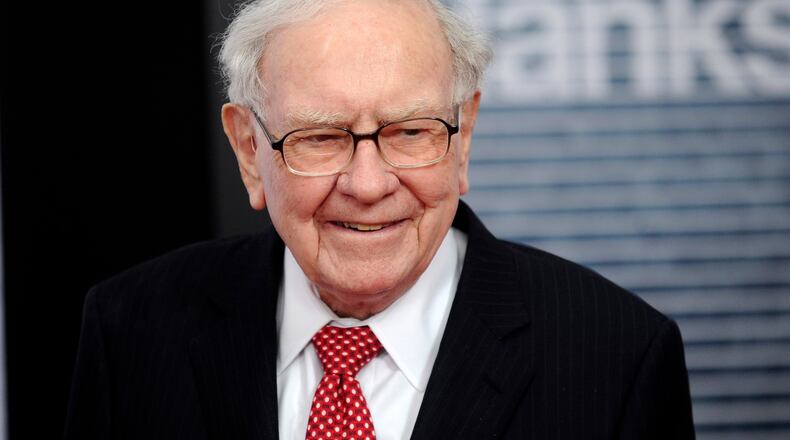Taking advice from Wall Street on deals is a bit like asking “the barber whether you need a haircut,” according to billionaire Warren Buffett.
Buffett said in his annual letter to Berkshire Hathaway shareholders Saturday that the current system of reviewing deals doesn’t always work well for investors because it almost always favors the deal that corporate CEOs propose. Companies should consider hiring two sets of advisers to argue for and against a deal before moving forward instead of just hiring a Wall Street firm that favors the deal, he wrote.
“Don’t hold your breath awaiting this reform: The current system, whatever its shortcomings for shareholders, works magnificently for CEOs and the many advisors and other professionals who feast on deals,” he wrote.
Buffett compared corporate deals to marriages that can be either blissful or troubled. He said Berkshire’s record is filled with more happy deals than unpleasant ones, but he has recently struggled to find acquisition targets to court. Berkshire held roughly $128 billion in cash and short-term investments at the year’s end because Buffett hasn’t found any reasonably priced major acquisitions in recent years. Berkshire is also facing more competition for acquisitions from private equity firms and other companies such as privately held Koch Industries.
Buffett’s letter is always well-read in the business world because of his remarkable track record, his habit of dissecting the economy or other topics, and his talent for explaining complicated subjects in plain language. But in this year’s letter, he mostly focused on Berkshire’s businesses and reiterated messages he has delivered before.
Investor Bill Smead said he thinks Buffett “pulled his punches” in the letter and is resisting leveling broad criticisms at this late stage of his career.
“Buffett is wisely stepping back. He will not be the moral compass in the market going forward,” said Smead, who leads Smead Capital Management.
Edward Jones analyst Jim Shanahan said Buffett kept this year’s letter focused on business and didn’t venture into other topics the way he has in the past.
“The annual letter has been getting shorter over the years, and it has lost some of the humor and wisdom that has made it so entertaining,” Shanahan said.
Buffett said he remains optimistic about the future of the conglomerate that he and his partner, Charlie Munger, have built over the decades, even though Buffett is 89 and Munger is 96 years old. Buffett said Berkshire’s managers and board members will protect the company after he and Munger are gone.
“We possess skilled and devoted top managers for whom running Berkshire is far more than simply having a high-paying and/or prestigious job,” Buffett wrote. “Finally, Berkshire’s directors — your guardians — are constantly focused on both the welfare of owners and the nurturing of a culture that is rare among giant corporations.”
Buffett, who has no plans to retire, didn’t offer any new details about the succession plan that has long been in place at Berkshire to eventually promote an internal manager to be the company’s next CEO.
But he did say that longtime Berkshire executives Greg Abel and Ajit Jain will also take questions along with Buffett and Munger at this year’s annual meeting. Since 2018, Jain has overseen all of Berkshire’s insurance businesses while Abel has overseen all of the conglomerate’s non-insurance business operations.
Andy Kilpatrick, a retired stockbroker who wrote a Buffett biography and follows the company closely, said Berkshire’s many businesses generally delivered solid results last year even though the company’s stock trailed the overall market. Berkshire’s stock gained 11 percent last year to the S&P 500’s 31.5 percent gain.
“It wasn’t an exciting year, but it was a good year,” Kilpatrick said.
In the fourth quarter, Berkshire reported earning $29.159 billion, or $11.94 per Class B share, because of a big improvement in the paper value of its investments. A year ago, Berkshire lost $25.4 billion, or $10.31 per Class B share, in the fourth quarter because of a big drop in the paper value of several of its stock investments.
Buffett has long said Berkshire’s operating earnings offer a better view of quarterly performance because they exclude investments and derivatives, which vary widely. By that measure, Berkshire’s operating earnings fell to $4.42 billion, or $1.81 per B share, in the quarter, from $5.72 billion, or $2.32 per B share, a year earlier.
The four analysts surveyed by FactSet expected Berkshire to report operating earnings of $2.39 per Class B share in the fourth quarter.
Berkshire Hathaway Inc. owns more than 90 companies, including BNSF railroad, Geico insurance and utilities. The company also has major investments in such companies as Apple, American Express, Coca-Cola and Bank of America.
About the Author
